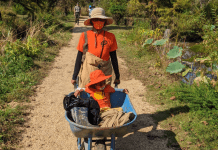Over the summer I found myself in a situation I never imagined I’d be in. It was day three of dropping my son off at summer day camp. For the first time in my life, I Googled, “how do I drop off my kid without them crying?” The first result, “Crying at Drop-Off—Perfecting the Preschool Separation,” seemed exactly like what I was looking for. But the introduction wasn’t working for me. It doesn’t accurately describe the situation I was experiencing in a realistic way. “Waterworks?” It was way more than that.
My son is a happy child who likes to make friends. He’s the kid on the playground who walks up to kids he doesn’t know, introduces himself, and asks them to play. Within 5 minutes, I’m alone watching him play — usually running as fast as he can — hearing kids I don’t know calling his name or talking about where he’s at. That’s who he is.
The first drop-off at day camp didn’t go well
When I dropped him off on his first day of day camp, that’s the attitude I was expecting. But instead, my son couldn’t speak, couldn’t move, couldn’t smile behind his mask. His eyes welled up with tears and his arms clung to me in a way they never have. He was trembling! He looked around the room, which was full of friendly faces, and decided he didn’t want to be there.
I was equally paralyzed, as I had never been in this situation before. I had no idea how to react. What’s more acceptable — sticking around and coaxing him through my departure, or running away while counselors restrained him from running out the door after me, kicking and screaming?
Quite frankly, I didn’t have time for either option. I hadn’t researched the best way to manage separation anxiety while I prepared my son’s backpack the night before. And I didn’t have much time to think about it, given that camp was starting at that moment, and I had to get to work. That first day was very hard. His counselor had to hold him while he tried to pull away and run after me as I left. And then, of course, I had left my purse on a table and I had to walk back in to get it. That caused more screaming, crying, pulling away. “There’s my mommy!” he screamed, in between all the tears.
The next day, I resorted to Tough Love
The next day, I gave him hugs and kisses and told him we were coming back. “Grown-ups come back,” I said, reminding him of what we learned on Daniel Tiger. I promised that he’d have a lot of fun with his new friends and get to play on the playground. I reminded him how much he loves to make new friends and that mommy and daddy would just be working all day and that’s no fun. When all of that didn’t work, I transitioned to Tough Love saying that if he didn’t go to camp he’d have to sit in his room all day without any YouTube or toys. And then I left.
I left feeling really crummy and exhausted. I felt bad telling him he’d have to sit in his room all day without YouTube or toys. That didn’t seem like the right strategy. When I started working, it was difficult to concentrate. I felt bad about what I had said and I was worried about how to manage drop-off the next day.
At pick-up, my husband and I were upbeat and positive. My son seemed to have had a good day at camp, and he was excited about a model airplane he was working on. He told us he had a cubby and he knows where to put his things. He said he had made friends! Surely drop-off the next day would be a breeze.
On the third day, I tried sticking around
It was not. His counselor suggested that one parent drop him off, as dropping him off as a family with his little brother in tow seemed to trigger the separation anxiety. This time, I dropped him off and told him that I would sit with him for a few minutes while camp got started. As he clung to my arm in a way that didn’t allow me to move, I realized that this strategy was a mistake. I had no out.
I chatted with some of the kids at his table, kids who were super friendly and excited that I found the jokes on their milk cartons. But this didn’t help either. Finally, I coaxed my son to let go by saying I’d stand by the door for a few minutes. I was hoping he’d get distracted, and I could slip out. Another rookie mistake. Instead, I saw my son straining his neck to make sure I was still there, and he was crying. Again, not a great out with this strategy.
So there I was, likely embarrassing myself in front of all the counselors who are totally capable of distracting my son to eventually enjoy himself if I would only leave. I was just standing there wondering, “How do I get out of this mess?” I quickly ran in to say goodbye and I left. Again, I felt crummy and exhausted, having given my son some Tough Love again somewhere in between the hugs and kisses.

And that’s where I was when I Googled, “how do I drop off my kid without them crying?”
But truthfully, why Google when you can ask trusted family and friends for advice on the topic? I reached out for advice, and I was overwhelmed with support and ideas. I was surprised to find out that leaving as quickly as possible was recommended by both parents, camp counselors, and preschool teachers. This was the first strategy I used. I felt this was the wrong choice, which is why I lingered later on.
Lingering was discouraged by everyone I asked. But beyond learning it’s totally acceptable to leave my son screaming and crying for me while I sprint out the door, I received some very creative ideas to help my son feel more secure when I drop him off at day camp or preschool.
Recommendations From Real Parents Who Have Been There for How to Deal With a Difficult Drop-off:
Send a photo of your family in your child’s backpack. I love this idea. My son brought a photo of our family the first day, and his counselor hung up the photo in his cubby. I didn’t even know he got a cubby!
Give your child something to take with them to remind them of you. This is a great idea, but toys and trinkets are not allowed at my son’s day camp or preschool. Instead, I drew a picture for my son to take with him to school. Notes or stickers are other ideas.
Wear matching bracelets. Several mom friends recommended this idea. You can purchase matching bracelets, make your own, or use a rubber band or hair elastic.
Read books about separation anxiety together. Many parents recommended reading “The Kissing Hand” by Audrey Penn. What a cute story. It comes with heart stickers you can use to give your child as a reminder that you love them while you’re apart. But you can also mark your child’s hand with a sharpie to remind them you’re there or give your child a coin to keep in their pocket that they can hold when they’re missing you.
Get your child excited to see their friends by allowing them to bring something to camp to share. This can be stickers, drawings, or a book.
What ultimately worked for us is having my husband do drop-off
I loved the recommendations from family and friends, but ultimately when my husband dropped our son off by himself, he practically skipped right in. Some parents revealed that this works for them as well. And after reaching out for advice, I realized that I wasn’t alone — difficult drop-offs are real, and they are nothing to be ashamed of. We’re not going to get it right right away or all the time. Keep dropping off, and over time, things will get better.
And that camp he was so scared to go to? It turned out to be his favorite of all the camps we signed him up for all summer. His favorite. Go figure.














